2013 Public Report on the Terrorist Threat to Canada
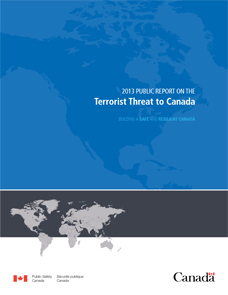 2013 Public Report on the Terrorist Threat to Canada PDF Version (3.5 MB)
2013 Public Report on the Terrorist Threat to Canada PDF Version (3.5 MB)
ISBN: 978-1-100-22342-1
Table of contents
- Ministerial Foreword
- Executive Summary
- Introduction
- Key Terrorism Developments in 2012
- Global Violent Extremists, Particularly Al Qaida and its Affiliates, Remain the Leading Terrorist Threat
- Terrorists are More Active in Africa
- Syria is Emerging as a Major Theatre of Operations for Terrorists
- State Support for Terrorism is an Ongoing Concern
- Homegrown Violent Extremism and Other Global Threats
- What the Terrorist Threat Means for Canadians
Ministerial Foreword

Terrorist attacks in Boston and Algeria have rightly raised questions from many Canadians. With the April 2013 arrest of two individuals for allegedly plotting to attack a passenger train, Canadians want to know what threats they face at home.
People have asked me how international conflicts can draw our citizens into terrorist activity. They want to know what the Government is doing about terrorism.
To this end, I am presenting the 2013 Public Report on the Terrorist Threat to Canada, a commitment our Government made in last year's Building Resilience Against Terrorism: Canada's Counter-terrorism Strategy. When the Government released its Strategy in 2012, it was with the understanding that partnership with Canadians is important and that citizens need to be informed of the terrorist threat in as open and straightforward a manner as possible.
The current report examines the most critical developments in terrorism in 2012. It looks at how terrorism can affect Canadians. It talks about some of the many measures taken by the Government in the last year to address the threat of terrorism.
Terrorism remains a global problem. I am convinced that the Government's Strategy is the most effective way to maintain the careful balance in providing security for Canadians while respecting the rule of law and human rights. I encourage Canadians to consult our Strategy to learn more about the Government's approach. I would also like to assure Canadians that the Government is taking every appropriate action to protect our country, our people and our interests.
In speaking with Canadians across the country, I have seen first-hand the value of the Government's partnerships with law enforcement, academia, the private sector and our varied communities. I am proud of what these partnerships have achieved in responding to terrorism.
Our Strategy is working. As I was recently reminded by the words of a prominent community leader who sits on our Cross-Cultural Roundtable on Security, a threat to any Canadian is a threat to us all.
Canada has made a difference in countering terrorism both at home and abroad. We will continue to do so.
The Honourable Vic Toews,
P.C., Q.C., M.P.
Minister of Public Safety
Executive Summary
The 2013 Public Report on the Terrorist Threat to Canada updates Canadians on how the terrorist threat has changed in the last year. The April 2013 arrests of individuals in Toronto and Montreal for alleged terrorism offences and the tragic attack in Boston demonstrate the ongoing threat posed by terrorism. The threats Canadians face at home are most often connected with and inspired by developments in the terrorist threat abroad. As a result, the Report focuses primarily on international developments. It examines what these changes mean for Canadians in Canada and abroad. It also shows how the February 2012 document, Building Resilience Against Terrorism: Canada's Counter-terrorism Strategy, guides Government action.
Global violent extremists, particularly al Qaida and its affiliates, remain the leading terrorist threat. Al Qaida has been in decline, but still provides strategic guidance to other global terrorist groups. Al Qaida's official regional affiliates, including al Qaida in the Arabian Peninsula, al Qaida in Iraq, al Qaida in the Islamic Maghreb and al Shabaab, pose a persistent threat. Some al Qaida affiliates withdrew from territories in Yemen and Somalia in 2012, but others made advances in Syria and Northern Mali. Although they often favour pursuing regional goals, al Qaida and its affiliates still intend to conduct international attacks if the opportunities arise.
Terrorists are more active in Africa. Political transition and instability in Africa have in some cases created room for terrorists to control new territory or to increase the scale of their operations in support of old conflicts. As the terrorist attack in Algeria early in 2013 demonstrated, violence can spill across borders, undermining regional stability. Northern Mali is at risk of becoming a hub for terrorist groups, attracting terrorists from other countries to the region.
Syria is emerging as a major theatre of operations for terrorists. The civil war in Syria has already provoked a humanitarian tragedy. The war is also emerging as a cause for terrorist activities. Terrorists from around the world are travelling to Syria to join groups involved in the conflict. Prolonged conflict and regional instability will only serve to increase the terrorist threat. Of particular concern is the prospect that fighters will return from Syria to their home countries to radicalize others or conduct terrorist attacks.
State support for terrorism is an ongoing concern. Canada “listed” both the Syrian Arab Republic and the Islamic Republic of Iran as state supporters of terrorism in 2012, facilitated by the Justice for Victims of Terrorism Act. Canada also listed Iran's Islamic Revolutionary Guard Corps - Qods Force as a terrorist entity under Canada's Criminal Code. State support to listed terrorist groups like Hizballah, Palestinian Islamic Jihad and Hamas is an ongoing concern for the Government of Canada. The Government is also concerned about the prospect of terrorist groups acquiring Syrian chemical and conventional weapons.
Homegrown violent extremists pose a threat of attack. In Canada, homegrown violent extremists have been involved in attempts to recruit supporters, raise funds or acquire other forms of support. Authorities in several other countries, particularly in Europe, disrupted plots or made arrests in 2012. The majority of these cases involved individuals influenced by the ideology of al Qaida. However, terrorists supporting a variety of causes and issues continue to challenge local authorities around the world. To help resolve this problem, the Government of Canada is taking additional steps to address individuals travelling abroad if they intend to facilitate or participate in terrorist activity.
Our Government will take all appropriate actions to counter terrorist threats to Canada, its citizens and its interests around the world. The Government of Canada takes a principled approach to the threat of terrorism. Its efforts remain grounded in respect for the rule of law and human rights. Canada has taken a stand against state-supported terrorism. It will monitor emerging global threats and list new terrorist entities when appropriate. It will also continue to explain as openly as possible what these threats mean for Canadians. The Government will take measures to counter the terrorist threat, whether a threat within Canada, support for violence abroad or activities that undermine Canada's efforts to secure international peace and security.
Introduction
Canada's Counter-terrorism Strategy
Released in February 2012, the Government's Building Resilience Against Terrorism: Canada's Counter-terrorism Strategy explains our national approach to countering terrorism. This single, comprehensive Strategy guides more than 20 federal departments and agencies to better align them to “prevent, detect, deny and respond” to terrorist threats.
Canada's success in remaining resilient to the terrorist threat continues to depend on having an approach that is flexible, forward-looking, and adaptable to an evolving global threat environment. More often than not, the terrorist threat Canadians face here at home is connected with international trends and developments. Capturing how events abroad impact the threat to Canada, Canadians and Canadian interests is critical to the Government of Canada's Strategy.
The Government's 2013 Public Report on the Terrorist Threat to Canada explains how the terrorist threat to Canada changed during 2012. As the majority of key developments in 2012 occurred overseas, the 2013 Public Report focuses primarily on international developments. It examines what these changes mean for Canadians in Canada and abroad. It also provides details on the measures that Government of Canada departments and agencies are taking to address this threat.
Framework of Canada's Counter Terrorism Strategy
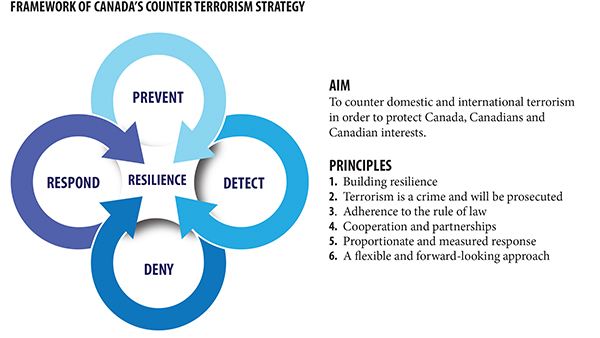
Image Description
This graphic provides the framework for Canada's Counter-terrorism Strategy.
It consists of four elements, Prevent, Detect, Deny, and Respond. Resilience is at the core of the four elements in the graphic.
The aim of the Counter-terrorism Strategy is to counter domestic and international terrorism in order to protect Canada, Canadians and Canadian interests.
The core principles of the Counter-terrorism Strategy are:
- Building resilience
- Terrorism is a crime and will be prosecuted
- Adherence to the rule of law
- Cooperation and partnerships
- Proportionate and measured response
- A flexible and forward-looking approach
The 2013 Public Report represents the combined efforts of several federal departments and agencies. As Canada's Counter-terrorism Strategy explains, each of these departments and agencies plays a critical role in countering the terrorist threat to Canada. In accordance with their individual mandates, many provide separate updates to Canadians on various aspects of the threat. The 2013 Public Report reflects trends observed in 2012 by government partners within the international security, law enforcement and intelligence communities. It also draws on consultations with non-government partners such as community leaders and those in academia and the private sector.
Terrorism Statistics for 2012 According to the Centre of Excellence - Defence Against Terrorism (COE-DAT), accredited by the North Atlantic Treaty Organization (NATO), more than 7,000 terrorist incidents in 75 countries were reported in 2012. These incidents claimed more than 11,000 lives and also involved more than 800 abductions. The number of incidents in the world decreased by roughly 40 percent compared to 2011. 59 percent of all reported incidents occured in Iraq, Pakistan and Afghanistan.
Terrorist Incidents 2012
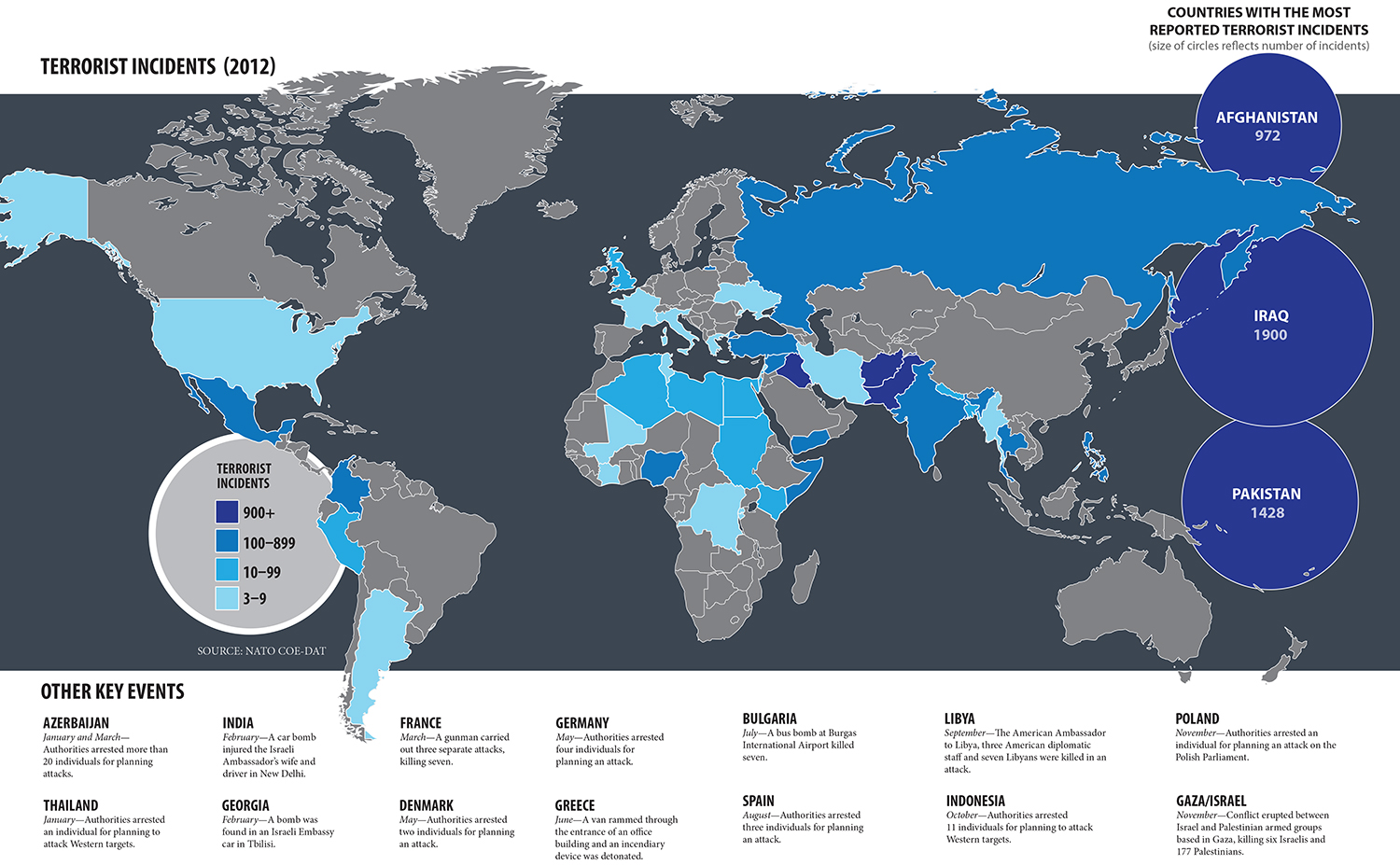
Image Description
This graphic provides a geographic overview of Terrorist Incidents in 2012. The source of the data is the Centre of Excellence - Defence Against Terrorism (COE - DAT) accredited by the North Atlantic Treaty Organization.
What is a Terrorist “Listing” under the Criminal Code?
Listing an entity is a public means of identifying a group or an individual as being associated with terrorism. It carries significant consequences. An entity's assets are frozen and may be subject to seizure, restraint or forfeiture. It is an offence for Canadians at home or abroad to knowingly participate in, or contribute to, directly or indirectly, any activity that facilitates the activities of a listed terrorist entity.
Hot Spot in Transition: Somalia
The election of a new Somali government and operations by Kenya and Ethiopia resulted in al Shabaab losing control of a significant amount of territory in 2012, particularly in Mogadishu and Kismayo. Al Shabaab's mishandling of humanitarian aid and its failure to stem attacks against civilians also weakened the group. Al Shabaab setbacks have led to a decrease in violence, but the group still poses a threat in Somalia and neighbouring countries. Foreign fighters in al Shabaab could join other regional conflicts or return to their home countries - like Canada - to undertake further violence.
Key Terrorism Developments in 2012
Global violent extremists, particularly al Qaida and its affiliates, remain the leading terrorist threat
Al Qaida has continued to decline, yet remains a threat
Al Qaida, led by Ayman al Zawahiri, further weakened in 2012. Its capacity to undertake terrorist activities was further constrained last year by global counter-terrorism efforts. Nevertheless, al Qaida still attempts to provide strategic guidance to regional affiliates and other terrorist groups around the world. It also persists in attempting to promote its ideological brand, attract recruits and encourage the establishment in the Middle East, Africa and Asia of sympathetic governments that share its ideology.
Although al Qaida has not successfully conducted an international terrorist attack in years, it is still planning to do so if the opportunity arises. Canada continues to be featured on al Qaida's list of priority targets.
Al Qaida's regional affiliates pose a persistent threat
Al Qaida and its leadership have suffered significant losses. This has reduced their capacity to plan and conduct attacks. In contrast, al Qaida's official regional affiliates, including al Qaida in the Arabian Peninsula, al Qaida in Iraq, al Qaida in the Islamic Maghreb and al Shabaab in Somalia, have remained active.
In the past year, both al Qaida in the Arabian Peninsula and al Shabaab have withdrawn from territory they previously controlled in Yemen and Somalia respectively, but they continue to pose a terrorist threat in the region. Al Qaida in Iraq has continued its local campaign of violence, and Canada listed the group as a terrorist entity under the Criminal Code in August 2012. In the Sahel region of Africa, al Qaida in the Islamic Maghreb worked with local armed groups and took advantage of regional instability to gain control of territory in Northern Mali.
“Canada continues to be featured on al Qaida's list of priority targets.”
Al Qaida's regional affiliates operate independently. Connections exist among groups, but their intentions and relative capacities to conduct terrorist attacks vary. Al Qaida and its affiliates are able to draw in members of disenfranchised or marginalized populations who are frustrated by a real or perceived lack of political and economic development, exploiting some of the same grievances that drove the “Arab Spring.” Al Qaida's affiliates most often favour achieving regional rather than international goals, preferring to attack local targets instead of foreign states. However, all al Qaida affiliates maintain an interest in conducting international attacks if the opportunity arises.
Terrorists continue to exploit ungoverned regions
New areas of conflict emerged in 2012, but terrorist groups continued to base their operations in isolated or ungoverned regions in countries like Pakistan, Somalia and Yemen. The two defining conflicts of the past decade - those in Afghanistan and Iraq - are both evolving as local security partners assume responsibility for counter-terrorism. Terrorism, however, remains a problem in both countries. Both continue to require international assistance to address the threat.
Canada's combat mission in Afghanistan ended in 2011, but terrorist groups present in the region still pose a threat to Canada and Canadian interests. In particular, the Taliban and the Haqqani Network continue to pose a significant terrorist threat to Canadians and Canadian interests in Afghanistan. The Government of Canada listed both groups as terrorist entities under the Criminal Code in May 2013.
“New areas of conflict emerged in 2012, but terrorists continued to base their operations in isolated or ungoverned regions...”
Al Qaida in the Arabian Peninsula's 2012 Airliner Plot
Terrorists continue to threaten the highly interconnected civil aviation system. This means that attacks originating elsewhere in the world could affect flights to or travelling over Canada. The ongoing threat to civil aviation was demonstrated in May 2012 when the United States government disrupted a plot by al Qaida in the Arabian Peninsula to bomb an airliner. The group had also failed in two previous plots in 2009 and 2010.
Listed Terrorist Entities Other than al Qaida
Besides al Qaida and its affiliates, Canada monitors several violent extremist groups which may share some tactics or goals with al Qaida, but which remain distinct terrorist threats with sectarian, political or ideological positions that differ from those of al Qaida. This includes listed terrorist entities like the Abu Sayyaf Group, Harakat ul-Mujahidin and Lashkar-e-Jhangvi, as well as nascent entities that could pose a terrorist threat.
Hot Spot in Transition: Northern Mali
Following a March 2012 coup in Bamako, al Qaida in the Islamic Maghreb and other armed groups took advantage of local instability to take control of most of Northern Mali. By the beginning of 2013, France, Mali and several allied nations had already begun coordinated operations to regain control of the territory seized in 2012. An African military force was also being planned to assume long-term operations in Mali. The conflict is expected to continue in 2013.
Terrorists are more active in Africa
Counter-terrorism efforts have focused on the Middle East and Asia over the past decade. However, important developments occurred across Africa in 2012, particularly in the Maghreb and Sahel regions. Political transition and instability in Africa have in some cases created room for terrorists and armed groups to control new territory or to expand their operations in support of old conflicts.
More countries are being affected by terrorism
Egypt faces extremists operating in the Sinai Peninsula, while Nigeria continues to face a persistent threat from Boko Haram. The evolving conflict in Northern Mali poses a challenge to regional stability. As the terrorist attack in Algeria early in 2013 demonstrated, regional violence can spill across borders, threatening neighbouring states.
At a Glance: Africa
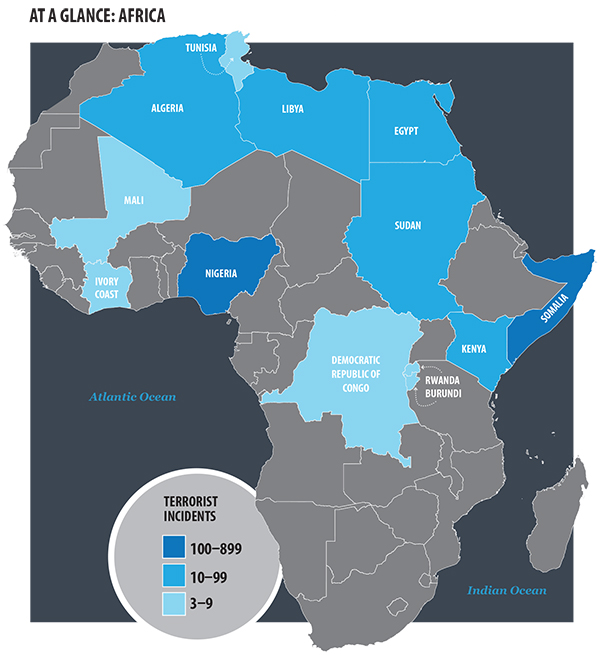
Image Description
This graphic provides a geographic overview of Terrorist Incidents in 2012, in Africa. The source of the data is the Centre of Excellence - Defence Against Terrorism (COE - DAT) accredited by the North Atlantic Treaty Organization.
The conflict in the Sahel risks creating a larger regional hub for terrorism. Fighters from al Shabaab and Boko Haram have travelled to Mali to fight alongside al Qaida in the Islamic Maghreb. Canada is concerned that the conflict is attracting individuals from other countries to the region, including two Canadian citizens involved in the Algeria attack. Canada is also concerned that terrorists operating in the Sahel could conduct further attacks in Africa, including attacking Canadian interests in the region, or traveling further abroad to conduct terrorist activities.
“Political transition and instability in Africa have in some cases created room for terrorists and armed groups to control new territory or to expand their operations in support of old conflicts.”
Terrorist activities are interwoven with activities involving other violent actors The September 2012 attack on the United States Consulate in Benghazi, Libya, serves as a reminder of the complexity of the security threats facing Canada and our allies in Africa. In the past year, terrorists have been increasingly active and active in more places, in Africa. The nature of threats in Africa is confounded by terrorist connections to a number of militias and more traditional criminal groups. Many of these other violent organizations have exploited regional instability and used violence to pursue their own goals.
Canada is assisting African partners
Canada is increasingly concerned about terrorist activity in Africa. The Government of Canada is working closely with local governments and international partners to address potential terrorist threats to Canadian interests in Africa. For example, Canada contributes to capacity building initiatives in affected regions across Africa. Canada has also participated in United States-led annual military exercises since 2006, pairing Western military forces with West African forces to foster regional security cooperation and empower African counter-terrorism partners. The Government of Canada emphasizes concentrating Canadian resources and expertise where they are needed most and where they best protect Canadian interests.
Syria is emerging as a major theatre of operations for terrorists
The Syrian civil war has become a humanitarian tragedy
The United Nations estimates that more than 60,000 people died in the conflict by the end of 2012. The number of casualties continues to rise. For Canadians living there, and Syrian and Lebanese communities in Canada, the conflict has a serious impact.
The Government of Canada is working with its allies to pursue a diplomatic solution, imposing sanctions on the Syrian government and providing support in regional states and through the United Nations for refugees displaced by the conflict. Canada is concerned that the civil war is turning Syria into a hub for terrorist activities that will heighten the terrorist threat to Canada, Canadians and Canadian interests.
Syria's civil war is an emerging cause for terrorists
Individuals have travelled to Syria from around the world - including from Canada - to fight the Syrian government. Some of these foreign fighters are suspected of joining local extremist groups. As a result, some experienced extremists from other conflict zones like Iraq and Afghanistan are now operating in Syria.
Both sides of the conflict in Syria involve many factions. Since its formation in January 2012, for example, Jabhat al Nusra has emerged as a leading extremist group. It has adopted terrorist tactics to fight the civil war, claiming responsibility for more than 500 attacks last year. Jabhat al Nusra has ideological and tactical similarities to al Qaida, particularly with fellow extremists operating across the border in Iraq. These ties also demonstrate how the conflict in Syria is increasing the terrorist threat globally.
At a Glance: Syria
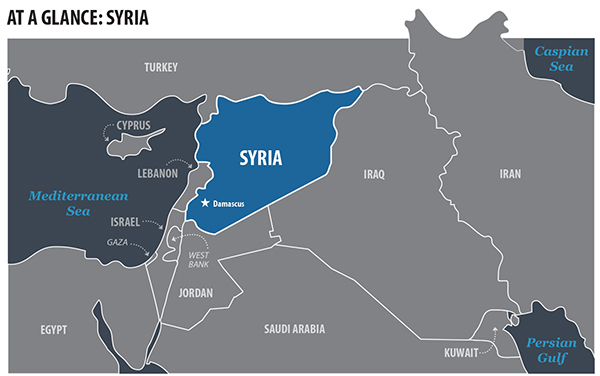
Image Description
A graphic of Syria and its neighbouring countries is provided.
Prolonged civil war in Syria has broader implications
The Government of Canada is concerned that prolonged conflict in Syria and the resulting regional instability will draw in foreign fighters and provide a training ground for terrorists. This threatens Canadian interests by undermining the prospect of peace in Syria and by reinvigorating the global appeal of extremist causes. Syria has already become a focus for terrorists in online extremist discussion forums. The conflict also risks spreading terrorist violence to Israel, Jordan, Lebanon and Turkey, and further abroad. Of particular concern is the prospect that fighters participating in the civil war in Syria with extremist or terrorist groups could return to their home countries, including Canada, to attempt to radicalize others or conduct terrorist attacks.
“Canada is concerned that the civil war is turning Syria into a hub for terrorist activities that will heighten the terrorist threat to Canada, Canadians and Canadian interests.”
Hizballah's Strength Affected by the Syrian Civil War
Hizballah is one of the most capable terrorist groups in the world. Members have been accused, for example, of organizing the July 2012 terrorist bombing in Burgas, Bulgaria that killed seven and injured thirty. These activities are a grave concern for Canada, particularly since a Canadian-Lebanese citizen was allegedly involved in the attack. Hizballah is bolstered by the current regime in Syria. Changes in that regime could to some extent diminish the power of Hizballah and could have a significant political impact in Lebanon.
The Justice for Victims of Terrorism Act
The Justice for Victims of Terrorism Act came into force in 2012. It allows victims to sue perpetrators of terrorism and those who support them, including foreign states listed by the Government of Canada under the State Immunity Act, for loss or damage that occurred as a result of an act of terrorism committed anywhere in the world. Listed foreign states like Syria and Iran lose certain immunities and become subject to the jurisdiction of Canadian courts, allowing civil suits to be filed against them.
State support for terrorism is an ongoing concern
In the past year, both Syria and Iran have come under increased criticism for supporting terrorism. The Government of Canada has taken a stand on the threat these activities pose to international security by listing Syria and Iran under the State Immunity Act.
Canada is challenging Syrian state support for terrorism
Canada has also taken steps to counter Syrian support for terrorism. Facilitated by the Justice for Victims of Terrorism Act, Canada listed Syria as a state supporter of terrorism in September 2012. This listing represents one step in holding the Syrian government responsible for its past and present actions, including its support for terrorist groups such as Hizballah, Palestinian Islamic Jihad and Hamas.
Canada is concerned that the Syrian government, which is carrying out a military campaign against its own people, could also support terrorist violence in neighbouring states like Lebanon and Turkey. Canada is also concerned that Syria's conventional and chemical weapons could fall into the hands of terrorist groups.
At a Glance: Iran and Syria
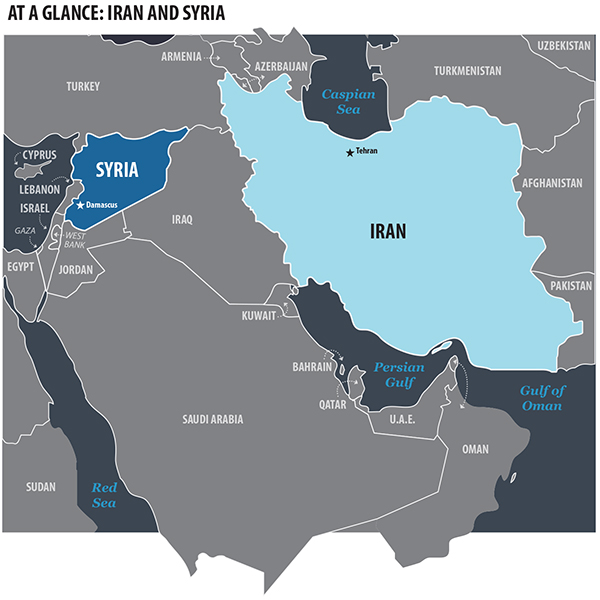
Image Description
A graphic of Iran, Syria and their neighbouring countries is provided.
The Iranian state supports terrorism
Last year, besides Canada's efforts to deter Iran's nuclear ambitions, Canada suspended diplomatic relations with Iran and closed the Canadian Embassy in Tehran. Canada also listed Iran as a state supporter of terrorism.
In December 2012, Canada listed Iran's Islamic Revolutionary Guards Corps - Qods Force (IRGC-QF) as a terrorist entity under Canada's Criminal Code. The IRGC-QF is known to provide clandestine arms, funding and training to listed terrorist groups including Hizballah, Palestinian Islamic Jihad and Hamas. This support also aids independent terrorist and extremist groups conducting campaigns of violence in Israel, Iraq, Lebanon, Syria and the Palestinian territories. For example, Iran is believed to have provided logistical support to Hamas during the November 2012 conflict in the Gaza Strip and Israel.
International violence is suspected to be linked to Iran
The Iranian government has been suspected of supporting other violence outside its borders. It is believed to have supported several foiled or attempted attacks against Israelis in Azerbaijan, Georgia, India and Thailand in 2012. In the autumn of 2011, the United States government charged two Iranian nationals for plotting to assassinate the Saudi ambassador to the United States on American territory, allegedly with support from the IRGC-QF.
“In the past year, both Syria and Iran have come under increased criticism for supporting terrorism. The Government of Canada has taken a stand on the threat these activities pose to international security by listing Syria and Iran under the State Immunity Act.”
Countering Homegrown Violent Extremism
The Government of Canada is working with a variety of partners to counter, and ultimately prevent, homegrown violent extremism. Success in this area requires outreach programs and engagement with community members and local organizations to raise awareness and to help identify those who may be attempting to radicalize others and promote violence. Academic research on terrorism and counter-terrorism through the $10 million Kanishka Project will help to further our understanding of the threat and inform policy development.
Homegrown violent extremism and other global threats
Homegrown violent extremism remains a threat in North America
No attacks occurred within Canada in 2012, but as demonstrated by the April 2013 attacks in Boston, homegrown violent extremists still pose a threat of terrorist attack in North America. In the past year Canadian law enforcement authorities investigated activities in Canada linked to terrorism. This resulted in charges in July 2012 against one individual and charges in April 2013 against two other individuals. The Government of Canada continues to identify individuals within Canada who want to commit or support terrorist acts here or abroad.
Canadian authorities continued to investigate a range of potential domestic terrorist threats. The majority of these involved individuals influenced by the ideology of al Qaida. Homegrown violent extremism can be based on other causes but is more limited in scope and scale than the activities of terrorist entities listed under the Criminal Code. The Government of Canada remains vigilant against any homegrown violent extremists or potential lone terrorists in Canada. Canada works with partners around the world to address homegrown violent extremism and the threat it may pose at home and abroad.
Homegrown violent extremism is also a threat in Europe
In March 2012, a homegrown violent extremist carried out three attacks that killed seven people in Toulouse and Montauban, France. These attacks served as a tragic example of the risk that even a lone individual may resort to terrorism to draw attention to real or perceived grievances. In 2012, authorities in Europe made arrests or disrupted extremist plots in France, Spain, Germany, Denmark, Greece, Poland, the United Kingdom and elsewhere. The majority of these incidents involved individuals influenced by the ideology of al Qaida. Others were connected to left-wing or right-wing groups, ethno-nationalist separatists or issue-based groups. In the United Kingdom, for example, several dissident Irish Republican groups, including the Real Irish Republican Army, have launched or attempted a number of attacks in Northern Ireland in the past year.
Terrorism is a global challenge
Outside of North America and Europe, other countries are struggling with similar threats. Turkish government negotiations with Kongra Gel (KGK), for example, are leading to a significant reduction in terrorist activities in Turkey and the potential for a ceasefire in 2013 with KGK members based in northeast Iraq. However, another, formerly dormant, terrorist group known as the Revolutionary People's Liberation Army resumed attacks against Turkish and Western interests in Turkey in 2012.
Terrorist groups remain active in Asia
A variety of local terrorist groups such as the Abu Sayyaf Group, Indian Mujahidin, Jemaah Islamiyyah, and Moro Islamic Liberation Front, continue to challenge authorities in India, Indonesia, the Philippines and Thailand, among other countries. The activities of these groups are mainly directed at achieving goals in the region, but incidents involving Western interests also occur. In October 2012, for example, Indonesian authorities arrested 11 individuals accused of plotting terrorist attacks. In Pakistan, the rise of sectarian extremist groups such as Lashkar-e-Jhangvi that target religious minorities and the continued activities of India-focused terrorists such as Lashkar-e-Tayyiba remain a concern. Since the end of the Sri Lankan civil war in 2009, Canada has remained on the watch for illegal international activities of the Liberation Tigers of Tamil Eelam (LTTE), especially the resumption of violence.
Crime and terrorism persists in the Americas
Several listed terrorist entities remain active in the Americas, including the Revolutionary Armed Forces of Colombia (FARC) and the National Liberation Army (ELN) in Colombia and the Shining Path in Peru. In 2012, Colombian military efforts against the FARC continued to reduce the group's size and influence, and the Colombian government began negotiations with the FARC. Still, the group remains a substantial threat to Colombian security. Local authorities are also combating the ELN and Shining Path where these groups have influence.
Canada continues to work with a variety of partners throughout the Americas to build local counter-terrorism capacity, support criminal justice reform and help tackle the broad security challenges posed by criminal violence and drug trafficking. Terrorism and criminal violence remain a challenge in the Americas, particularly when such activities cross into Canada and the United States.
“The Government of Canada will take all appropriate action to counter the terrorist threat to Canada, its citizens and its interests around the world.”
What the Terrorist Threat Means for Canadians
Terrorism poses a persistent threat
Evolving conflicts abroad continue to shape the nature of the terrorist threat to Canada, Canadians and Canadian interests. Global violent extremists, particularly al Qaida and its regional affiliates, remain the leading terrorist threat. Iran and Syria continue to pose a threat to Canadian interests by providing state support to terrorism. Afghanistan and Iraq - sites of the two defining conflicts of the past decade - continue to face the challenge of terrorism. Newer conflict areas, including Syria and Northern Mali, are a growing concern. Such developments abroad play a significant role in driving international terrorism and radicalizing homegrown violent extremists.
No country is immune from terrorism
A terrorist attack could still occur within Canada. The April 2013 arrests of individuals in Quebec and Ontario who were allegedly conspiring to carry out a terrorist attack and the tragic events in Boston remind us of this possibility. Terrorists may also attempt to recruit supporters, raise funds or acquire other forms of support in Canada. The terrorist threat impacts how we conduct diplomacy, business, travel, security and development assistance, both at home and abroad. It can threaten Canadian charities, foreign investments and international development projects. It can threaten Canadian goals, prosperity and quality of life. Terrorism poses a risk to Canadians travelling abroad - tourists, soldiers, diplomats, aid workers and business people. Terrorists may target an individual, a community or Canadian society as a whole. A threat to any Canadian is a threat to us all.
International travel of individuals intending to support terrorism abroad poses a threat to Canada
Canada and our allies continue to observe individuals travelling abroad to participate in foreign conflicts. Several dozen Canadians are believed to have travelled, or attempted to travel, abroad in recent years to facilitate or participate in terrorist activity. Media attention on these individuals has often focused on those intending to go to Pakistan, Syria or Somalia, but individuals have also travelled to other places in Africa, the Middle East, Asia and elsewhere.
With the 2013 Combating Terrorism Act, the Government of Canada is taking further steps to limit such travel, particularly when the activities of Canadians might pose a threat in other countries. Canada is concerned about any individual who travels abroad to receive paramilitary training, seek indoctrination in extremist ideologies or support a terrorist group. These activities not only destabilize foreign countries and threaten their citizens, but they also threaten Canadian interests. Individuals who become involved with extremist or terrorist groups abroad may return to their home countries, including Canada, to radicalize others or conduct attacks.
Canadian Terrorism Casualties
According to the Government of Canada's Integrated Terrorism Assessment Centre (ITAC), 194 Canadians have been killed since 2001 by terrorists or while combating terrorism. A total of 36 Canadians were killed in terrorist incidents in the following countries: the United States (2001), Indonesia (2002), Iraq (2003), Afghanistan (2006, 2008, and 2009), India (2008) and Morocco (2011). In addition, 158 Canadian Armed Forces members have lost their lives during Canada's mission in Afghanistan.
Canadian Partnerships in Action
The successful Canadian arrests of individuals accused of terrorist offences in 2012 and 2013 demonstrate the effectiveness of the RCMP-led Integrated National Security Enforcement Teams (INSETs). INSETs enhance the collective ability of multiple federal, provincial and municipal security and law enforcement partners to work together in countering terrorist threats. In addition to the INSETs based in Vancouver, Toronto, Ottawa and Montreal, a new INSET was established in Edmonton in 2012.
Canadian Definition of Terrorist Activities
The Criminal Code defines terrorist activity to include an act or omission undertaken, inside or outside Canada, for a political, religious or ideological purpose that is intended to intimidate the public with respect to its security, including its economic security, or to compel a person, government or organization (whether inside or outside Canada) from doing or refraining from doing any act, and that intentionally causes one of a number of specified forms of serious harm.
“Individuals who become involved with extremist or terrorist groups abroad may return to their home countries, including Canada, to radicalize others or conduct attacks...Several dozen Canadians are believed to have travelled, or attempted to travel, abroad in recent years to facilitate or participate in terrorist activity.”
Terrorists threaten Canada when they try to enter the country
Canada is also concerned that foreign terrorists may attempt to enter the country. The Government took action in 2012 to reduce illegal migration. Still, human smuggling operations continue to target our country and known terrorists have attempted to enter Canada under false pretences. In 2012, Canada and the United States made a series of advances under the Beyond the Border Action Plan, including improving the management of people crossing borders.
Terrorists threaten Canadian efforts to promote international peace and security
Beyond international cooperation, the Government of Canada is working with partners to build their individual and combined capacities to confront terrorism abroad. These capacity building efforts are delivered directly through various Canadian departments and agencies, under joint initiatives with partner countries and through programming with international organizations, such as Interpol or the United Nations Office on Drugs and Crime. These activities build the counter-terrorism capacities of individual states, but also promote international standards, sharing and cooperation that in turn contribute to effective counter-terrorism efforts globally.
Terrorist activities on the internet remain a challenge
The Government has observed the increasing ability of terrorists since 2008 to benefit from the latest developments in digital communications, social media and the Internet to spread their message around the globe, attract adherents to their cause, and plan and control attacks. Some terrorist groups have shown interest in incorporating cyber attacks into their activities. This includes aspirations to develop cyber capabilities to target Canadian and allied interests. Terrorists may not currently be able to cause serious damage through cyber attacks, but their ability will likely increase over time. The Government's 2010 report, Canada's Cyber Security Strategy, addresses this evolving threat.
Fundraising and providing material support for terrorism is also a threat
Canada remains committed to preventing terrorists from acquiring financial or logistical support from individuals, businesses or organizations in Canada. Like terrorist activities on the Internet, terrorist financial networks cross borders and involve complex international networks. The Government of Canada works with a range of domestic and foreign partners to detect and prosecute terrorist financing.
While the terrorist threat remains, some positive developments have occurred
No terrorist attacks occurred in Canada in 2012. Around the world, the number of reported terrorist incidents declined in 2012. A number of terrorist plots were foiled or disrupted, particularly in Europe. In several countries, including Somalia and Yemen, terrorist groups suffered setbacks under pressure from counter-terrorism authorities. In a few countries, including Colombia and Turkey, negotiations with extremists helped reduce the terrorist threat.
The Government of Canada takes a principled approach in reponding to the threat of terrorism
Canada's counter-terrorism efforts at home and around the world are grounded in respect for the rule of law and human rights. Human rights are enshrined in the Canadian Charter of Rights and Freedoms, and protected by mechanisms of accountability. The need to ensure respect for human rights also stems from applicable human rights and humanitarian law. The Government of Canada is committed to promoting the safety and security of Canadians, and of our international partners, without undermining these rights and eroding the very values that Canada strives to protect.
The Government of Canada will take all appropriate actions to counter terrorist threats to Canada, its citizens and its interests around the world
Canada has taken a strong stand against state-supported terrorism. It will continue to monitor emerging global threats and list new terrorist entities. It will also continue to explain as openly as possible what these threats mean for Canadians. The Government of Canada will take measures to counter the terrorist threat, whether it involves a threat within Canada, support for violence abroad or activities that undermine Canadian goals for international peace and security.
Government Action against Illegal Migration
The 2012 Protecting Canada's Immigration System Act introduced new measures to address the crime of human smuggling, including the ability to designate “irregular arrivals.” This action seeks to stop foreign criminals, human smugglers and terrorists from abusing our immigration and refugee system. It also seeks to protect genuine immigrants to Canada while preventing the entry of criminals and providing procedures to remove those who do manage to get in.
Counter-terrorism Capacity Building Program (CTCBP)
The CTCBP is a Canadian program managed by the Department of Foreign Affairs and International Trade. The CTCBP supports projects aimed at improving the capacity of beneficiary countries to confront terrorist activities, primarily through training, funding, equipment and technical and legal assistance. A companion Anti-crime Capacity Building Program provides similar assistance to countries struggling with other types of crime and violence.
Government Action to Deprive Terrorists of Funding
The Financial Transactions and Reports Analysis Centre of Canada (FINTRAC) analyzes millions of financial transaction reports to provide financial intelligence in support of counter-terrorism analysis, investigations and prosecutions. It provides this information to domestic law enforcement and intelligence agencies and financial intelligence units around the world. These measures help to identify money laundering and terrorist financing activities in a number of areas, including financial services, real estate, trade and non-profit activities. Since 2007, FINTRAC has made over 500 disclosures to authorities relating to terrorist financing.
A threat to any Canadian is a threat to us all.
- Date modified: